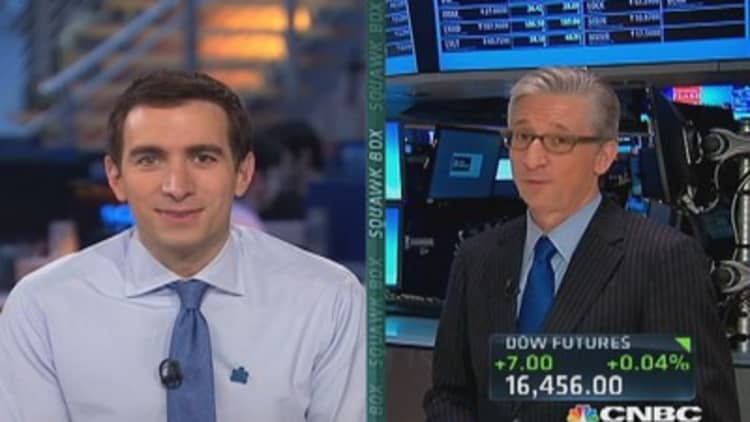Is the stock market rigged?
The epic food fight between Brad Katsuyama of IEX and Bill O'Brien from BATS Global Markets on CNBC's "Power Lunch" on Tuesday obscured a larger message: the average investor buying, say, 100 shares of IBM through his Ameritrade account in all likelihood will never interact with a high frequency trader. That person's trade will get executed at the best bid and offer, and will pay a commission under $10—far cheaper than he or she would have paid twenty years ago.
The real impact is on institutional traders, who have found it very difficult to execute orders in large sizes.

There are already knock-on effects from the debate. There are reports that high-speed trading firm Virtu has postponed its initial public offering (IPO). Not to get technical, but the IPO was never on the calendar so it can't get technically postponed.
What everyone has been waiting for is for them to set terms, because you can't market your deal without setting a range. It was expected to happen earlier this week, with the road show beginning now. By all indications, those plans may be up in the air, and with good reason. The IPO couldn't have come at a worse time for them.
Two problems:
a) Goldman Sachs is business, for $30 million reportedly. Goldman paid $6.5 billion for Spear Leeds in 2000.that could dramatically affect the valuation of Virtu.
b) The Michael Lewis flap over "rigged" markets could affect them if there are changes in market structure. In fact, they state that very clearly on page 28 of their S-1: "Regulatory and legal uncertainties could harm our business."
Elsewhere:
1)Welcome to the stock market of the second quarter of 2014 —brought to you by the same people who brought you the first quarter!
Gold miners, biotech, semis, high growth tech, home builders: all are big movers thus far (which has been all of a week). It's been funny to watch the trading so far in April: seeing guys run back into the exact same houses that burned them the first time around, as one trader noted to me.
Yesterday was about restoring the same narrative: "the same names that didn't work in Q1 are being given a mulligan and guys are trying again," one trader laughingly told me. He's right, despite the lip service paid to "value over growth," Tuesday was a lot like January.
Here's the problem: it takes a lot of heavy lifting to move these names. Buying biotech in big volume, for example, sucks up a ton of capital. When the money ran out in March, they rolled over.
Some of these names are well north of $100: Biogen and Regeneron are both over $300.
Also helping stocks: for the last several days the Japanese yen has again started weakening, now at its weakest since January. That means the yen/carry trade may be coming back into play, which also means more margin debt and leverage.
Most global bourses are up:
a) The FTSE All-World Index, which represents the global stock market, is approaching the historic 2007 high.
b) Most of Europe is up, but for the most part the main trend this year is European debt is having a huge rally...yields are collapsing in Greece, Italy, Spain, even France.
c) The (EEM), the Big Short of Q1, is working on a 10 day winning streak. India at an historic high.
2)Online advertising marketplace The Rubicon Project (RUBI) priced 6.7 million shares at $15, low end of $15 to $17 range.
—By CNBC's Bob Pisani



